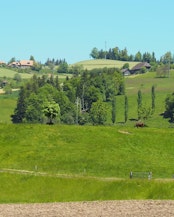Ecological infrastructure of the Canton of Bern

Ecological infrastructure of the Canton of Bern
- Our Objective
Safeguarding biodiversity and ecosystem services in the long term—by means of efficient implementation of a functioning ecological infrastructure.
- Figures
The project was launched on June 1, 2020 and has been concluded.
Summary
With its Swiss Biodiversity Strategy and associated action plan, the Swiss Federal Council seeks to preserve or restore ecosystem services for the long term. Central to this is the development of a functioning ecological infrastructure by 2040. Ecological infrastructure means a network of natural and near-natural habitats. It consists of core areas (like raised bogs or fens) and connecting corridors (like wildlife bridges or hedgerows).
Through 2024, the cantons laid the foundations for their ecological infrastructure. In the Canton of Bern, this project defined regionalized goals and priority areas based on the current state of the planned core and connectivity areas. Priority areas indicate where existing core areas and connectivity areas should be maintained or improved, and where new areas should be established.
Technical planning was carried out in close collaboration with the agencies concerned. Actual implementation of the ecological infrastructure falls under the revision of the sectoral plan for biodiversity and was not part of this project.
The LANAT-6 project has been carried out in collaboration with the Office for Agriculture and Nature of the Canton of Bern (LANAT).
Project Connections
Timeline
More information on the project
Project Update February 17, 2025
Through 2024, the cantons laid the foundations for their ecological infrastructure. In the Canton of Bern, this project defined regionalized goals and priority areas based on the current state of the planned core and connectivity areas. Priority areas indicate where existing core areas and connectivity areas should be maintained or improved, and where new areas should be established. Technical planning was carried out in close collaboration with the agencies concerned. Actual implementation of the ecological infrastructure falls under the revision of the sectoral plan for biodiversity and was not part of this project. More information: Ökologische Infrastruktur (Information about ecological infrastructure on the website of the Canton of Bern; available in German and French)
The development of invasive non-native plant populations
Project Update February 17, 2025
The development of invasive non-native plant populations (lines) and the costs of containment measures (bars) over time, shown here for no measures (red), isolated measures (blue), and concerted measures (green). Prompt, concerted containment measures clearly pay off: they effectively reduce and control the populations of invasive non-native plants over the long term. Graphic designed by: Amt für Abfall, Wasser, Energie und Luft des Kantons Zürich (Office for Waste, Water, Energy and Air of the Canton of Zurich)
Team
- Project contactProject contact
Daniel Bärtschi
Head of Hub Bern


